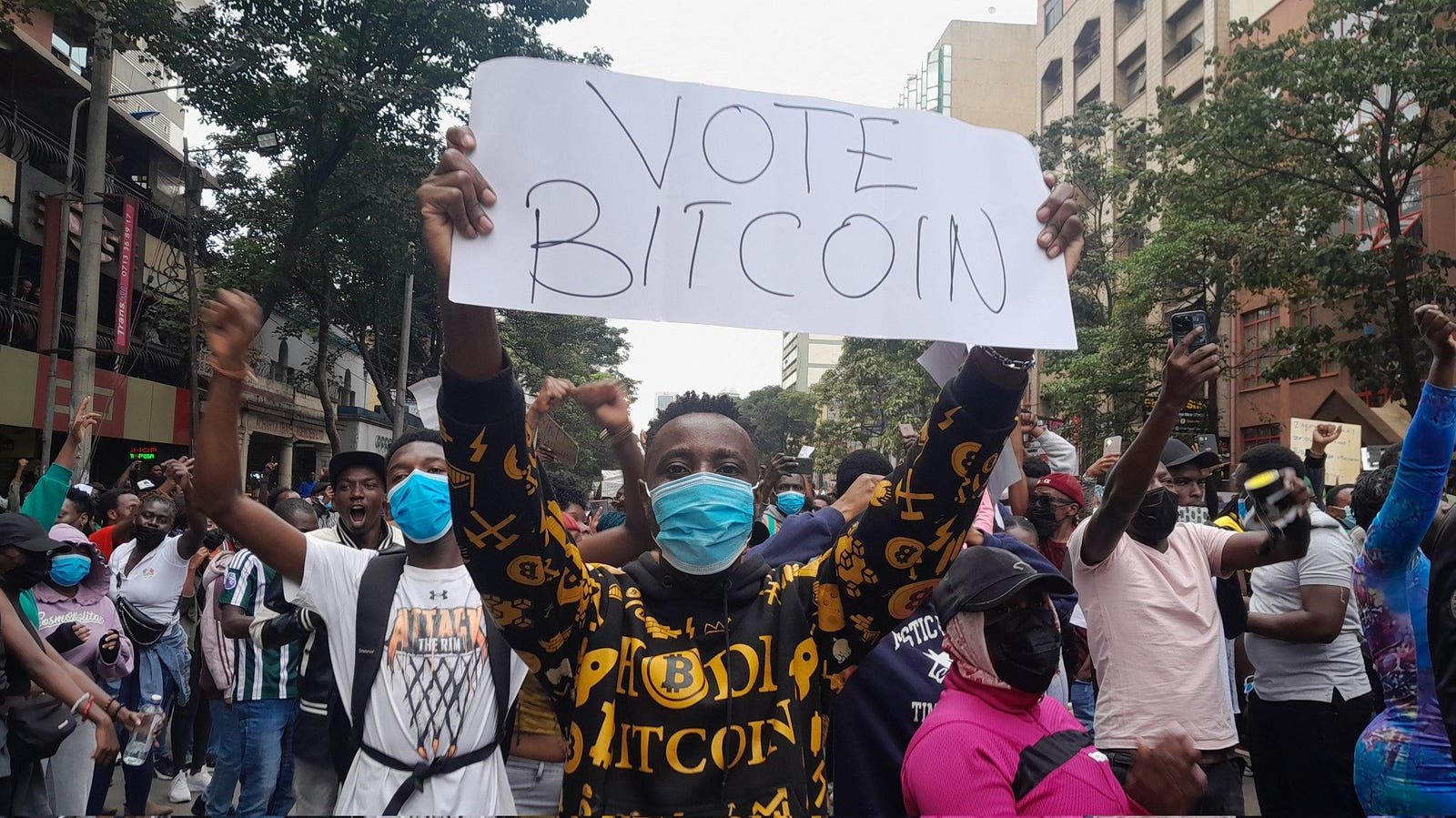News
Kenyan Youth Embrace Bitcoin Amid Deadly Protests Against Finance Bill

Kenyan Bitcoiner Protests Against Controversial 2024 Finance Bill
Felix Mukungu
On Tuesday, June 25, thousands of people took to the streets of Nairobi, the capital of Kenya, to protest against the controversial finance bill recently passed by the Kenyan Parliament.
What began as a demonstration of Kenyans’ legitimate grievances against the bill’s across-the-board tax increases soon saw the Kenya Defense Forces (KDF) called in after President Ruto’s address to the nation on the need to restore “normalcy” in a context he described as “Violence and anarchy” left more than 300 injured and at least 20 dead in shootings involving police, according to the Amnesty International report. Kenya section.
Amid the chaos, Bitcoin
Bitcoin
Awareness among young people is also growing. As a Kenyan Bitcoiner and Machankura Team member Noelyne Sumba said: “The decentralized nature of Bitcoin offers a level of financial freedom that is becoming increasingly attractive to Kenyan youth. »
A Kenyan Bitcoiner shows a Bitcoin poster amid a protest led by young Kenyans against the controversial finance… [+] bill 2024
Felix Mukungu
Kenya’s controversial 2024 funding bill
Currently, Kenya’s public debt stands at 68% of its GDP, which is higher than the IMF and World Bank recommendation of 55%. As part of a set of reforms and strategies aimed at aligning with the fiscal reforms agreed with the IMF in 2021 to significantly reduce Kenya’s reliance on borrowing, the Kenyan government has increased borrowing rates. taxation and levies. The most ambitious attempt was formalized in the now infamous Finance Bill 2024/25.
The bill, first proposed in May this year, aimed to generate about $2.3 billion in revenue to help cover the country’s budget deficit. Moreover, beyond reducing the budget deficit by increasing revenue collection, the bill aimed to reduce public spending.
Additionally, the bill introduced numerous tax proposals, including a 1.5% digital tax on local online platforms whose services include employment, rental, food delivery and ride-hailing services (although subject to parliamentary approval), a value added tax (VAT) on electric bicycles. , buses and solar and lithium-ion batteries, at 16% VAT on ordinary bread, sugarcane transport, financial services and foreign exchange operations.
On June 13, Kenyan youth began organizing on social media to make their voices heard under the hashtag #RejectFinanceBill2024, first on TikTok and then on X (the platform formerly known as Twitter). The goal was to get Parliament to vote no on the bill, but this was seen as ineffective, and the strategy quickly shifted to taking to the streets in a peaceful protest planned for June 18.
According to Noelyne, following her interview with Bitcoin Magazine“The passage of the Finance Bill will likely reduce the already low standard of living of Kenya’s 56 million citizens. This bill continues a trend of taking advantage of the future of the country’s youth through excessive borrowing “This continued borrowing has led to a debt-to-GDP ratio of 67% as of 2023, which will continue to have a significant impact on economic stability and growth.”
In addition to the tax rates introduced in the bill, this bill would set greater precedents; as Noelyne points out, “the government is threatening privacy and data security by proposing that the Kenya Revenue Authority (KRA) access personal data without consent. » Adding that “this decision could potentially lead to tyrannical government profiling and misuse of private information. »
The protests and the passage of the bill by the Kenyan Parliament
Following the largely peaceful protest on June 18, Kenyan police arrested more than 230 protesters, who were later released thanks to pressure from young people on social media. On June 19, the Kenyan parliament’s budget committee decided to cancel some controversial amendments to the bill, such as the 16% VAT on bread. Yet many Kenyans believe this is not enough.
On June 20, the bill passed second reading in the Kenyan parliament by 204 votes to 115, sparking the protest that had begun earlier in anticipation of the vote. The protests reached a boiling point on June 20 when demonstrators entered the Kenyan parliament building, escalating further after part of the building was set on fire, including heavy police fire in an attempt to crowd control. On June 26, according to the Kenya Medical Association, more than 13 people had been killed the day before.
Despite these reports and the nationwide internet outage that occurred earlier in the day, protesters were unfazed and continued to make their voices heard.
These efforts finally bore fruit, as earlier today at 7 p.m. Kenya local time, President Ruto recognized the voice of the people in a speech, declaring that he would not sign the 2024 Finance Bill into law. , as the people had announced.
Bitcoin as hope for Kenya and its youth
As Noelyne pointed out when asked what young people think about Bitcoin’s role in all this: “Many young Kenyans see Bitcoin as a way to escape restrictive monetary policies imposed by international financial institutions, which have contributed to the country’s economic challenges. » that “integrating Bitcoin into the financial system could reduce reliance on external debt and provide an escape from oppressive government policies that hinder economic and individual growth.”
It is important to emphasize that Bitcoin provides economic freedom to individuals and nation states. To this end, many African Bitcoiners believe that African countries can only escape decades of entrenched economic slavery by realizing this and taking Bitcoin more seriously.
While Kenya is already making progress in developing renewable energy via bitcoin miningIt is only a matter of time before governments across Africa realize that Bitcoin can significantly alleviate many of its economic and infrastructural challenges and is a more viable alternative to their current approaches.
News
Bitcoin soars above $63,000 as money flows into new US investment products

Bitcoin has surpassed the $63,000 mark for the first time since November 2021. (Chesnot via Getty Images)
Bitcoin has broken above the $63,000 (£49,745) mark for the first time since November 2021, when the digital asset hit its all-time high of over $68,000.
Over the past 24 hours, the value of the largest digital asset by market capitalization has increased by more than 8% to trade at $63,108, at the time of writing.
Learn more: Live Cryptocurrency Prices
The price appreciation was fueled by record inflows into several U.S.-based bitcoin cash exchange-traded funds (ETFs), which were approved in January this year.
A Bitcoin spot ETF is a financial product that investors believe will pave the way for an influx of traditional capital into the cryptocurrency market. Currently, indications are favorable, with fund managers such as BlackRock (BLK) and Franklin Templeton (BEN), after allocating a record $673 million into spot Bitcoin ETFs on Wednesday.
Learn more: Bitcoin’s Success With SEC Fuels Expectations for an Ether Spot ETF
The record allocation surpassed the funds’ first day of launch, when inflows totaled $655 million. BlackRock’s iShares Bitcoin Trust ETF (I BITE) alone attracted a record $612 million yesterday.
Bitcoin Price Prediction
Earlier this week, veteran investor Peter Brandt said that bitcoin could peak at $200,000 by September 2025. “With the push above the upper boundary of the 15-month channel, the target for the current market bull cycle, which is expected to end in August/September 2025, is raised from $120,000 to $200,000,” Brandt said. published on X.
The influx of capital from the traditional financial sphere into Bitcoin spot ETFs is acting as a major price catalyst for the digital asset, but it is not the only one. The consensus among analysts is that the upcoming “bitcoin halving” could continue to drive flows into the bitcoin market.
The Bitcoin halving is an event that occurs roughly every four years and is expected to happen again next April. The halving will reduce the bitcoin reward that miners receive for validating blocks on the blockchain from 6.25 BTC to 3.125 BTC. This could lead to a supply crunch for the digital asset, which could lead to price appreciation.
The story continues
Watch: Bitcoin ETFs set to attract funds from US pension plans, says Standard Chartered analyst | Future Focus
Download the Yahoo Finance app, available for Apple And Android.
News
FRA Strengthens Cryptocurrency Practice with New Director Thomas Hyun

Forensic Risk Alliance (FRA), an independent consultancy specializing in regulatory investigations, compliance and litigation, has welcomed U.S.-based cryptocurrency specialist Thomas Hyun as a director of the firm’s global cryptocurrency investigations and compliance practice. Hyun brings to the firm years of experience building and leading anti-money laundering (AML) compliance programs, including emerging payment technologies in the blockchain and digital asset ecosystem.
Hyun has nearly 15 years of experience as a compliance officer. Prior to joining FRA, he served as Director of AML and Blockchain Strategy at PayPal for four years. He established PayPal’s financial crime policy and control framework for its cryptocurrency-related products, including PayPal’s first consumer-facing cryptocurrency offering on PayPal and Venmo, as well as PayPal’s branded stablecoin.
At PayPal, Hyun oversaw the second-line AML program for the cryptocurrency business. His responsibilities included drafting financial crime policies supporting the cryptocurrency business, establishing governance and escalation processes for high-risk partners, providing credible challenge and oversight of front-line program areas, and reporting to the Board and associated authorized committees on program performance.
Prior to joining PayPal, Hyun served as Chief Compliance Officer and Bank Secrecy Officer (BSA) at Paxos, a global blockchain infrastructure company. At Paxos, he was responsible for implementing the compliance program, including anti-money laundering and sanctions, around the company’s digital asset exchange and its asset-backed tokens and stablecoins. He also supported the company’s regulatory engagement efforts, securing regulatory approvals, supporting regulatory reviews, and ensuring compliance with relevant digital asset requirements and guidelines.
Thomas brings additional experience in payments and financial crime compliance (FCC), having previously served as Vice President of Compliance at Mastercard, where he was responsible for compliance for its consumer products portfolio. He also spent more than seven years in EY’s forensics practice, working on various FCC investigations for U.S. and foreign financial institutions.
Hyun is a Certified Anti-Money Laundering Specialist (CAMS) and a Certified Fraud Examiner (CFE). He is a graduate of New York University’s Stern School of Business, where he earned a bachelor’s degree in finance and accounting. Additionally, he serves on the board of directors for the Central Ohio Association of Certified Anti-Money Laundering Specialists (ACAMS) chapter.
Commenting on his appointment, Hyun said, “With my experience overseeing and implementing effective compliance programs at various levels of maturity and growth, whether in a startup environment or large enterprises, I am excited to help our clients overcome similar obstacles and challenges to improve their financial crime compliance programs. I am excited to join FRA and leverage my experience to help clients navigate the complexities of AML compliance and financial crime prevention in this dynamic space.”
FRA Partner, Roy Pollittadded: “As the FRA’s sponsor partner for our growing Cryptocurrency Investigations and Compliance practice, I am thrilled to have Thomas join our ever-expanding team. The rapid evolution of blockchain and digital asset technologies presents both exciting opportunities and significant compliance challenges. Hiring Thomas in a leadership role underscores our commitment to staying at the forefront of the industry by enhancing our expertise in anti-money laundering and blockchain strategy.”
“Thomas’ extensive background in financial crime compliance and proven track record of building risk-based FCC programs in the blockchain and digital asset space will be invaluable as we continue to provide our clients with the highest level of service and innovative solutions.”
“FRA strengthens cryptocurrency practice with new director Thomas Hyun” was originally created and published by International Accounting Bulletina brand owned by GlobalData.
The information on this website has been included in good faith for general information purposes only. It is not intended to amount to advice on which you should rely, and we make no representations, warranties or assurances, express or implied, as to its accuracy or completeness. You must obtain professional or specialist advice before taking, or refraining from, any action on the basis of the content on our website.
News
Bitcoin trades around $57,000, crypto market drops 6% ahead of Fed decision

-
Bitcoin fell in line with the broader cryptocurrency market, with ether and other altcoins also falling.
-
Financial markets were weighed down by risk-off sentiment ahead of the Fed’s interest rate decision and press conference later in the day.
-
10x Research said it is targeting a price target of $52,000 to $55,000, anticipating further selling pressure.
Bitcoin {{BTC}} was trading around $57,700 during European morning trading on Wednesday after falling to its lowest level since late February, as the world’s largest cryptocurrency recorded its worst month since November 2022.
BTC has fallen about 6.3% over the past 24 hours, after breaking below the $60,000 support level late Tuesday, according to data from CoinDesk. The broader crypto market, as measured by the CoinDesk 20 Index (CD20), lost nearly 9% before recovering part of its decline.
Cryptocurrencies have been hurt by risk-off sentiment in broader financial markets amid stagflation in the United States, following indications of slowing growth and persistent inflation that have dampened hopes of an interest rate cut by the Federal Reserve. The Federal Open Market Committee is due to deliver its latest rate decision later in the day.
Ether {{ETH}} fell about 5%, dropping below $3,000, while dogecoin {{DOGE}} led the decline among other major altcoins with a 9% drop. Solana {{SOL}} and Avalanche {{AVAX}} both lost about 6%.
Bitcoin plunged in April, posting its first monthly loss since August. The 16% drop is the worst since November 2022, when cryptocurrency exchange FTX imploded, but some analysts are warning of further declines in the immediate future.
10x Research, a digital asset research firm, said it sees selling pressure toward the $52,000 level due to outflows from U.S. cash exchange-traded funds, which have totaled $540 million since the Bitcoin halving on April 20. It estimates that the average entry price for U.S. Bitcoin ETF holders is $57,300, so this could prove to be a key support level.
The closer the bitcoin spot price is to this average entry price, the greater the likelihood of a new ETF unwind, 10x CEO Markus Thielen wrote Wednesday.
“There may have been a lot of ‘TradeFi’ tourists in crypto – pushing longs all the way to the halving – that period is now over,” he wrote. “We expect more unwinding as the average Bitcoin ETF buyer will be underwater when Bitcoin trades below $57,300. This will likely push prices down to our target levels and cause a -25% to -29% correction from the $73,000 high – hence our $52,000/$55,000 price target over the past three weeks.”
The story continues
UPDATE (May 1, 8:56 UTC): Price updates throughout the process.
UPDATE (May 1, 9:57 UTC): Price updates throughout the process.
UPDATE (May 1, 11:05 UTC): Adds analysis from 10x.
News
The Cryptocurrency Industry Is Getting Back on Its Feet, for Better or Worse

Hello from Austin, where thousands of crypto enthusiasts braved storms and scorching heat to attend Consensus. The industry’s largest and longest-running conference, which can sometimes feel like a religious revival, offers opportunities to chat and listen to leading names in crypto. And for the casual observer, Consensus offers a useful glimpse into the mood of an industry prone to wild swings in fortune.
Unsurprisingly, the mood is noticeably more positive than it was a year ago, when crowds were sparse and many attendees were quietly confiding that they were considering switching to AI. In practice, that means some of the more obnoxious elements are back, but not to the level of Consensus 2018 in New York, when charlatans parked Lamborghinis outside the event and the hallways were lined with booth girls and scammers pitching “ICOs in a box.”
This time around, Elon Musk’s Cybertrucks have replaced Lamborghinis as the vehicle of choice for marketers. One of the most notable publicity stunts was a startup that paid a poor guy to parade around in the Texas sun in a Jamie Dimon costume, wig, and mask, and then staged a mock assault on him by memecoin characters.
Outside the event was a giant “RFK for President” truck, while campaign staffers manned a booth instead — a reflection of both the election year and crypto’s willingness to latch onto any candidate, no matter how outlandish, who will talk about the industry. RFK himself is scheduled to address the conference on Thursday.
Excesses aside, the general sense of optimism was understandable. The cryptocurrency market has not only recovered from the wave of fraud that nearly sank it in 2022, it is riding a new wave of political legitimacy. This month, cryptocurrencies scored once-unthinkable political victories in Washington, D.C., and there is a sense that the industry has not only withstood the relentless regulatory assaults of SEC Chairman Gary Gensler and Sen. Elizabeth Warren, but is poised to defeat them.
And while cryptocurrency is still searching for its flagship application, the optimists I spoke with pointed to signs that it is (once again) upon us. Those signs include the rapid advancement of zero-knowledge proofs as well as the popularity of Coinbase’s Base blockchain and, perhaps most importantly, the large-scale arrival of traditional finance into the world of cryptocurrencies – a development that not only provides a major financial boost, but also a new element of stability and maturity that will, perhaps, tame the worst of crypto’s wilder side. Finally, this consensus marked the end of the Austin era as the conference, under new leadership, will be held in Toronto and Hong Kong in 2025.
The story continues
Jeff John Roberts
jeff.roberts@fortune.com
@jeffjohnroberts
This story was originally featured on Fortune.com
-

 News1 year ago
News1 year agoBitcoin soars above $63,000 as money flows into new US investment products
-

 DeFi1 year ago
DeFi1 year agoEthena downplays danger of letting traders use USDe to back risky bets – DL News
-

 News1 year ago
News1 year agoFRA Strengthens Cryptocurrency Practice with New Director Thomas Hyun
-

 DeFi1 year ago
DeFi1 year agoZodialtd.com to revolutionize derivatives trading with WEB3 technology
-

 Markets1 year ago
Markets1 year agoBitcoin Fails to Recover from Dovish FOMC Meeting: Why?
-

 DeFi1 year ago
DeFi1 year ago👀 Lido prepares its response to the recovery boom
-

 Markets1 year ago
Markets1 year agoWhale Investments in Bitcoin Reached $100 Billion in 2024, Fueling Crazy Investor Optimism ⋆ ZyCrypto
-

 Markets1 year ago
Markets1 year agoWhy Bitcoin’s price of $100,000 could be closer than ever ⋆ ZyCrypto
-

 DeFi1 year ago
DeFi1 year agoPancakeSwap integrates Zyfi for transparent, gas-free DeFi
-

 Markets1 year ago
Markets1 year agoWhales are targeting these altcoins to make major gains during the bull market 🐋💸
-

 DeFi1 year ago
DeFi1 year ago🏴☠️ Pump.Fun operated by Insider Exploit
-

 News1 year ago
News1 year agoHow to make $1 million with crypto in just 1 year 💸📈












